#Culhwch and Olwen
Explore tagged Tumblr posts
Text

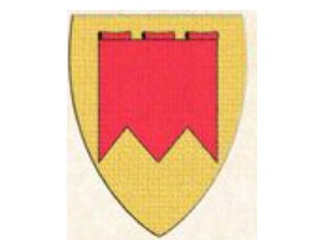
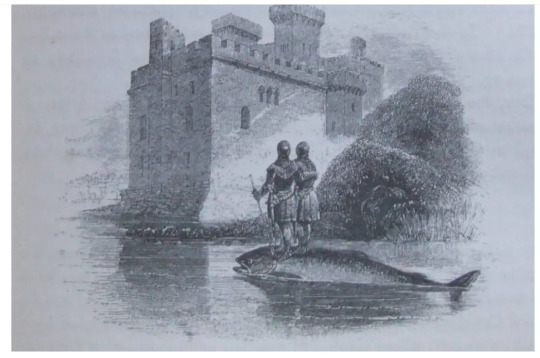
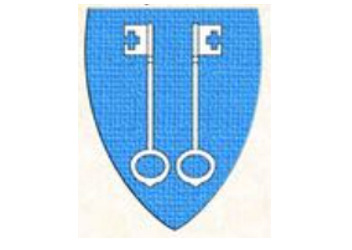

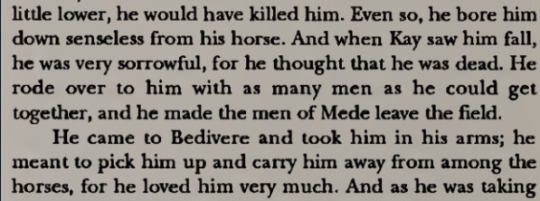






Sir Kay, Seneschal of King Arthur's Court, Harold J. Herman / Illustration from the Mabinogion / The Quest for Olwen, trans. Gwyn Thomas and Kevin Crossley-Holland / The Story of Merlin, trans. Rupert T. Pickens / Illustration from The Quest for Olwen, Margaret Jones / Wace's Roman de Brut, trans. Eugene Mason / The Mabinogion, trans. Lady Charlotte Guest
a collection of sir kay and sir bedivere: companions/lovers/worse, for @queer-ragnelle's may day parade
#fellas is it gay to forever be linked to your companion throughout texts and time#them being the first of arthur's knights ohhh im so emo about them.... arthuriana's most eternal couple#you guys should read that article i linked if ur interested in how kay changes over time btw!! it's really good#bedivere#sir bedivere#kay#sir kay#culhwch and olwen#vulgate cycle#mabinogion#arthuriana#arthurian legend#arthurian literature#medieval literature#knights of the round table#kay x bedivere#bedikay#i think ive seen people using that tag?#may day parade#I know this isn’t art so maybe it doesn’t count but the formatting alone should count as an art this was nightmarish to create#kay tag
177 notes
·
View notes
Text

it's may day 😌🥳🥳
#gwyn ap nudd#edern ap nudd#arthuriana#mabinogion#welsh mythology#culhwch and olwen#digital art#artists on tumblr#art tag#hey if nothing else his dedication is impressive 😌#edern gets beaten by geraint once and gives up
173 notes
·
View notes
Text
We all know Culhwch and Olwen is this massive, sprawling quest, right? But have you considered the alternative view of it simply being a couple's retreat for Cai and Bedwyr (riding salmon taxis, defeating a giant together - the couple who slays together, stays together - and getting custody of their shared son, Goreu? Just a thought!
#mabinogion#arthuriana#the mabinogion#welsh mythology#welsh myth#arthurian legend#arthurian mythology#like if the fourth branch is literally just lleu and blodeuwedd need coupla therapy then culhwch ac olwen is just a couples retreat#culhwch ac olwen#culhwch and olwen#cai#bedwyr#sir kay#sir bedivere#i really do think cai and bedwyr were and are those two chaotic gays with an even more chaotic bi bud in arthur#the three of them have no brain cell#gwenhwyfar or gwalchmai have it#once again i apologise for giving the arthuriana crowd my shit posts#once again i apologise to my ancestors for the utter shite that comes out my mouth#iesu grist there's no hope
59 notes
·
View notes
Text

(Source: Culhwch and Olwen)
King Arthur demonstrates his great talent as a bard by skillfully weaving together this very subtle remark.
You can almost hear teeth grinding in the background.
#nothing quite as character-establishing as listing off your personal property as things you'll never give up in a million years#an insult and a compliment in one#king arthur#queen guinevere#gwenhwyfar#excalibur#culhwch and olwen#welsh mythology#arthuriana#arthurian mythology#arthurian legends
43 notes
·
View notes
Text



#arthuriana#arthurian literature#art#kay#bedivere#sir kay#arthurian meme#arthurian legend#sir bedivere#comic#knight am i right#arthur#king arthur#culhwch and olwen#culhwch as olwdn#the giant magical salmon whose name i have forgotten#knights am i right
57 notes
·
View notes
Text
BBC Merlin walked to Arthur & Merlin (2015) could run.
#arthuriana#arthurian legend#arthurian mythology#welsh mythology#king arthur#merlin#myrddin#sir lucan#olwen#culhwch and olwen#arthur & merlin 2015#my post#i <3 indie arthurian films#i reeeeally like this arthur he was great#i wish there was a sequel!!!
14 notes
·
View notes
Text
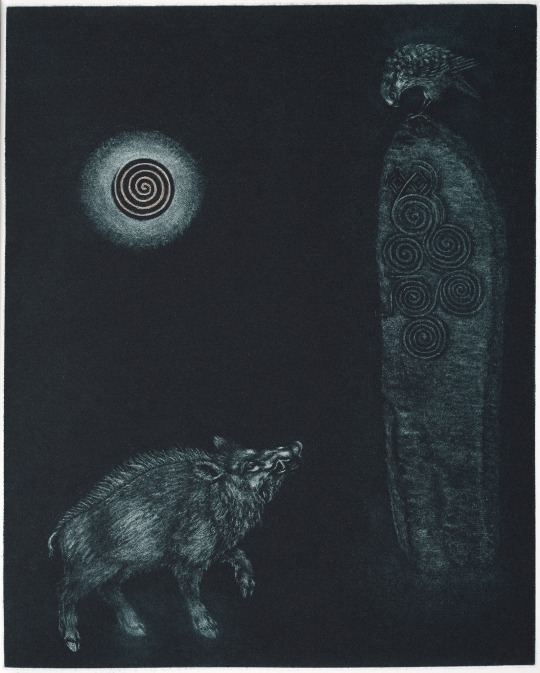
the negotiation 1999
#art#dark art#1990s art#90s art#20th century art#dark#spooky art#Culhwch and Olwen#welsh#welsh artist#Culhwch ac Olwen#folklore#folk stories#folk art#wales#boar
90 notes
·
View notes
Text

Kjeh kjeh that's what he sai-
(luin siis tän ja mun äiti kysy et mitäs mie myhäilen)
#suomitumppu#voi vittu#suomalainen#suomitumblr#vittu#ei helvetti#perkele#ei saatana#kulttuurin kurittama#culhwch and olwen#sir kei
17 notes
·
View notes
Photo

Legends and myths about trees
Celtic beliefs in trees (15)
H for Huath (Hawthorn) - May 13th - June 9th
“May tree - Sixth month of the Celtic tree calendar (Ref)”
colour: midnight blue; Gem: lapis lazuli; Gender: female; Patrons: Olwen, Blodeuedd, Chaldean, Humen, Selene, Virgin Mary; Symbols: love + marriage, fertility + birth, reproduction, heart
The short, thorny, graceful hawthorn. The slender hawthorn trunk and branches twist as the years go by. In winter they are particularly beautiful, standing clinging to misty wildernesses and craggy rocky outcrops, or clustered on open ranges of hills that their appearance is spectacular. Leaves and flowers appear simultaneously in May, signalling the change of season from spring to summer. Hawthorn flowers bloom in clusters, so that at the height of spring, rows of white froth run across the fields and mountains, a scene aptly captured by the English writer H. E. Bates as 'the fluffy cream floating in May'.
In spring, when the hawthorn flowers are in full bloom, the air releases a musky, sweet, rich fragrance all around. Small round berries turn burgundy in autumn.
In Ireland, hawthorn is still cherished as a magical tree protected by the fairy kingdom. Tradition has it that if you cut down a single hawthorn tree standing alone in a field or burial mound, you will lose your livestock and household possessions.
Hawthorn trees protect wells and springs as fairy trees. The beautiful flowers of hawthorn are also said to deliver prayers to the heavens. Even today, many people tie rags and other items to hawthorn trees standing near wells and springs, wishing for good luck or that their love will reach the person they love.
Before Christianity, hawthorn was the supreme fertility symbol and at the May Festival, people confided their love, danced to their heart's content and made love in the woods. Among the Celts, spring was the season for marriage, and it was customary to bring a bouquet of hawthorn flowers to weddings to ensure that the couple would be blessed with children.
In Britain, the earliest known hawthorn goddess was Olwen ('white footprints'), a woman of courage, wit and beauty. The well-known mythological tale of Culhwch and Olwen, in which King Arthur's cousin, Culhwch, overcame 40 impossible tasks that seemed virtually unattainable set out by Olwen's father, the giant king, Yspaddaden, and marry his beloved Olwen.
As the beautiful, white hawthorn flowers opened, people celebrated the power of nature and love to bring new life into the world and marvelled at the miracles of sexual activity, pregnancy and childbirth. For the Celts, sexual activity, pregnancy and childbirth were not something to be ashamed of, but an essential part of life and a sacred expression that one could love.
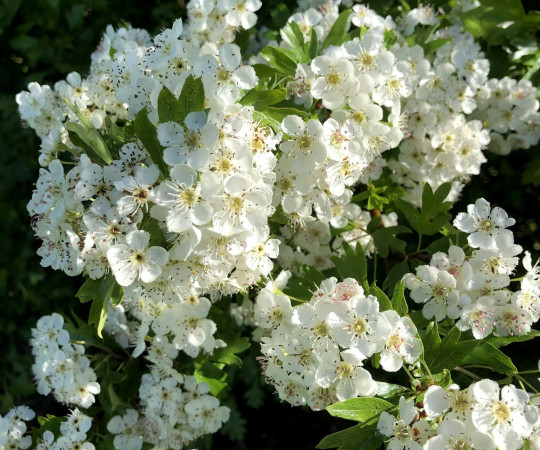
木にまつわる伝説・神話
ケルト人の樹木の信仰 (15)
HはHuath (サンザシ) - 5月13日 - 6月9日
『5月の木〜 ケルトの木の暦(参照)の第6月』
色: ミッドナイト・ブルー; 宝石: ラピスラズリ; 性: 女性; 守護神: オルェン、ブロダイウェズ、カルデア、ヒュメン、セレネ、聖母マリア; シンボル: 愛+結婚、豊穣+出産、生殖、心臓
背丈が低くとげをもった優雅なサンザシ。ほっそりとしたサンザシの幹や枝は、年が経つにつれてねじれていく��冬になるとその姿は特に美しく、霧の立ち込めた荒野や、ごつごつとした岩の露頭にしがみつくように立つ姿、また広々と連なる丘に群れをなしている様子は、見事というより他はない。葉と花は5月に同時に姿を現し、春から夏に季節が変わることを知らせている。サンザシの花は群れを成して咲くことから、春の盛り、白い泡立ちの列が野山を縦横に走り、その様子を英国人作家のH・E・ベイツは、「五月に浮かび上がるふわふわしたクリーム」と的確に表現している。
春、サンザシの花が満開になると、麝香 (じゃこう)のような甘く濃厚な香りがあたり一面に放たれる。小さな丸い実は、秋になるとワインレッドに変わる。
アイルランドでは今もなお、サンザシは妖精の国に守られた魔法の木として大切にされている。野原や埋葬塚に一本だけぽつんと立っているサンザシの木を切ると家畜を失うか家財を無くすという伝承もある。
サンザシは妖精の木として、井戸や泉を守っている。また、サンザシの美しい花は祈りを天まで届けてくれるという。現在でも井戸や泉のそばに立つサンザシには、幸運が訪れるますように、あるいは好きな人に思いが届きますようにと願う大勢の人々が、布きれや品物を結び付けている。
キリスト教以前は、サンザシは最高の豊穣のシンボルであり、5月祭には、人々は愛を打ち明け、心ゆくまで踊り明かし、森で愛を交わした。ケルト人の間で春は結婚の季節であり、夫婦が子宝に恵まれるように、結婚式にはサンザシの花束を持っていく習慣があった。
英国では、サンザシの女神として最も古くから知られているのが、勇気と機転と美貌の持ち主、オルェン (‘白い足跡’の意)。アーサー王の従兄弟であるキルフーフが、オルェンの父である巨人の王アスパザデンが課した事実上達成不可能と思われる40の無理難題を克服し、愛するオルウェンと結婚した神話『キルフーフとオルェン』がよく知られている。
美しく、そして白いサンザシの花が開くと、人々は、新しい命を宿す自然と愛の力を祝福し、性の営み、妊娠、出産という奇蹟に驚きの声を上げた。ケルト人にとって���性行為や妊娠、出産は恥ずべきことではなく、人生になくてはならない大切な一部であり、人は愛することができるということの神聖な表現であった。
#trees#tree legend#tree myth#celtic mythology#celtic calender#hawthorn#may tree#magical tree#fairy tree#culhwch and olwen#legend#mythology#folklore#white footprints#philosophy#nature#art
146 notes
·
View notes
Text
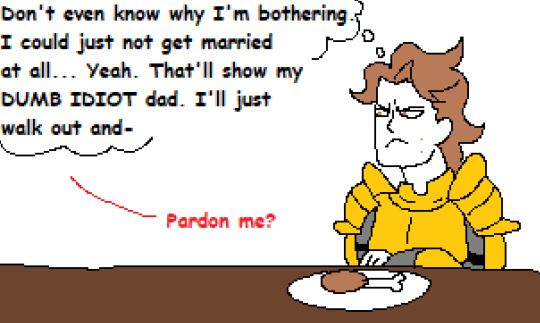
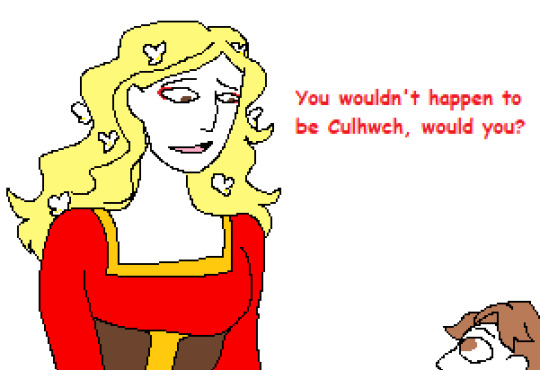


Culhwch and Olwen Part 7
She's the daughter of a giant so I think she'd be Tall.
26 notes
·
View notes
Text
my dream would be to write a gay retelling of culhwch and olwen
9 notes
·
View notes
Text




the twrch trwyth in the search for olwen !!
#maybe twrch trwyth posting is too niche i was just extremely hyped to see my buddy#oooo you guys want to watch this soo badly oooooooo#arthuriana#arthurian legend#culhwch and olwen#the twrch trwyth#welsh folklore#park watches arthurian movies#arthurian literature#i WILL get people to see this through the power of overtagging this post#king arthur#animation#also ignore how grainy these are theyre a screenshot from a youtube video which was already grainy
40 notes
·
View notes
Text
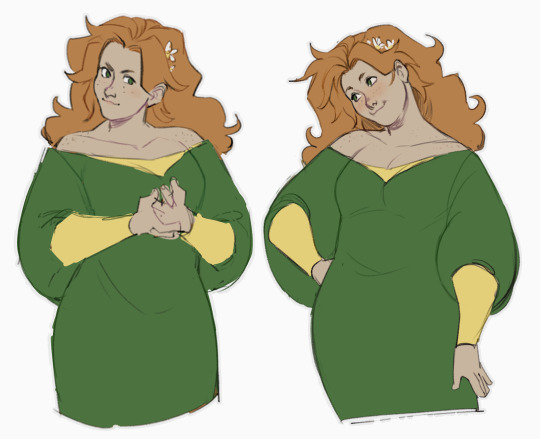
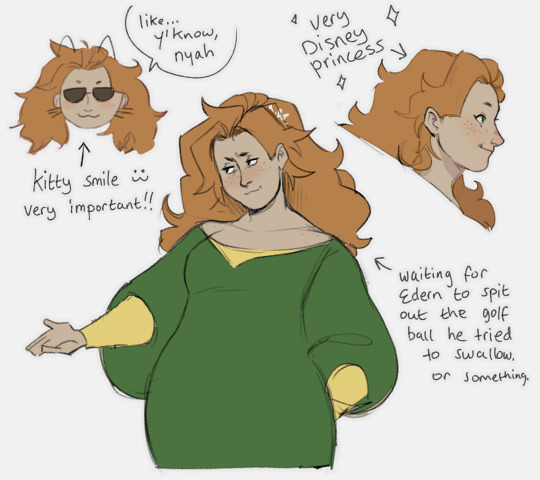
everyone say hello to creiddylad! 🥰👋🥳🥳🥳🥳
#creiddylad ferch lludd#welsh mythology#arthuriana#culhwch and olwen#gwyn ap nudd#the mabinogion#celtic mythology#digital art#artists on tumblr#i hope you like her 🥺🙏💖#i was going to wait until may day to post her but i just couldn't wait i'm sorry#of course designing her was easy#i simply thought “what sort of lady would i spend the rest of existence fighting over 😌😌💕”#art tag#anyway. i would die for her
172 notes
·
View notes
Text
Shwmae pawb! (That's 'hi everyone!' in Welsh. :3)
So, GIANTS. Giants are stock characters in both Arthurian AND Celtic legends. Wales has many giants and almost all of them are absolute BASTARDS. Fun. Also, some are connected to mountains. Also fun!
Anyways, I thought I'd do a quick lil thing about them cuz honest we have so many you can - and somebody probably will - do a book about them.
So, just a quick thing about Welsh. 'Fawr,' which is an appellation means 'the Great. It can also mean big. It's why when people swear in Welsh and say 'Iesu Fawr' what they're saying is, "BIG JESUS!"
Two diddy things:
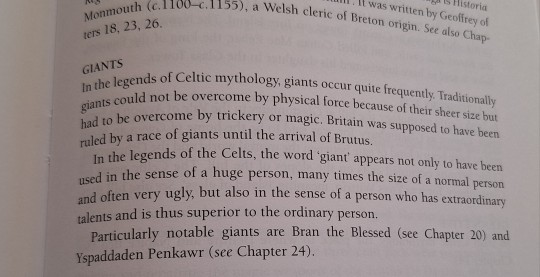
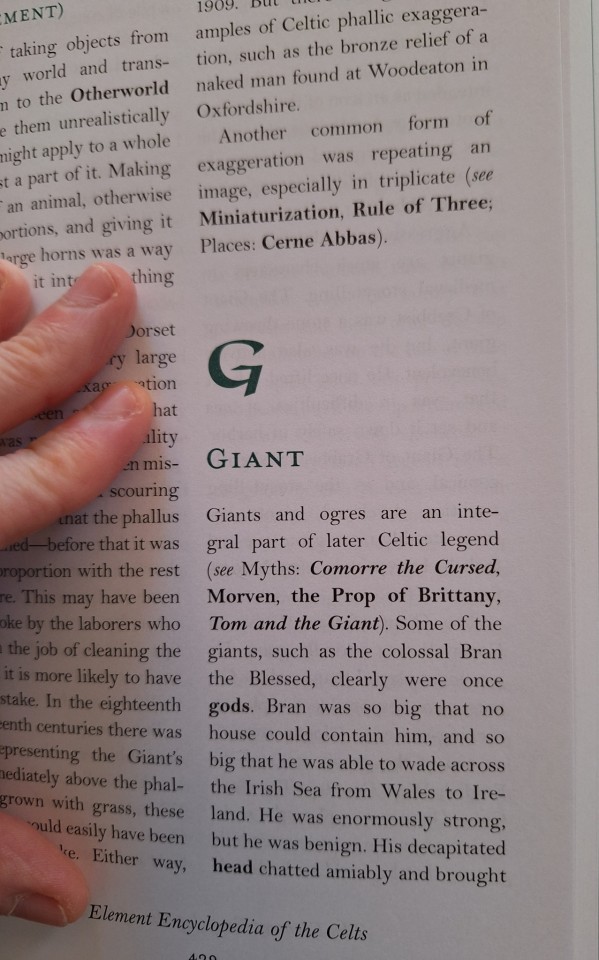
I enjoy the fact that 'Giant' is doing double duty. Can be bastard, can be nice. Spin the cauldron and see which u get.
Now, I was gonna do your biggies like Arthur, Gwenhwyfar, Cai, Gwalchmai, Uthyr, etc, etc. But, honestly, you probably know that they were, at one point or another, seen to be giants in Welsh mythology. (And Arthur was probably on the Bastard side more than good if you believe Gildas. But he is biased cuz Arthur killed his brother so 🤷🏻♀️)
So, a lot of the giants are connected to places like Cader Idris - who is probably the most famous giant lad after Bendigeidfran - or Y Cath Palug who prowled around Môn (modern-day Anglesey.)
I kinda debated on whether or not to cover Ysbaddaden Pencawr but I decided to because he is probably a giant you've all heard of and weaves into the 'giants associated with places' because his fort is supposed to be in their Preseli Hills which are in western Wales, mainly in the Pembrokeshire Coast Path. They also have really pretty bluestone and slate too!
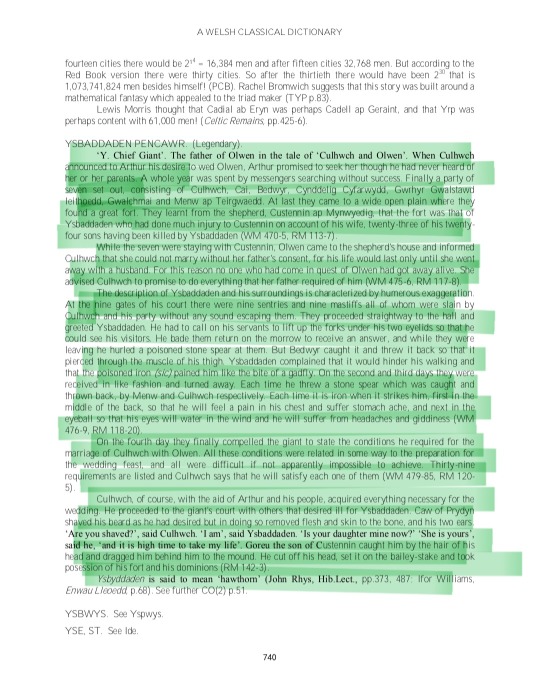
Now, you all know the story in Culhwch and Olwen but I just kinda like the fact that Ysbaddaden means 'Hawthorn,' because it supposedly symbolised love and protection in Celtic mythology which, if u think about it, Ysbaddaden kinda loves Olwen in his own way. (I mean he'll die if she marries but, y'know. Doesn't mean he doesn't love her.)
Next up, IDRIS GAWR.

Yes, he of chair fame. If you go up it then supposedly you'll either come back down mad or a poet. I would seriously pray to become a poet. The walk down would make me mad enough. It's STEEP!
Now, before Arthur killed him and buried him up there, he was a king - who may have been a real-life dude. UNCLEAR! - and it was said that he could sit on the mountain and survey his whole kingdom which is COOL AS FUCK. Apparently, his motley band of giants: Yscydion, Ophrom, and Ysbryn also have mountains named after them in the vicinity of Cader Idris.
Next: Rhitta Gawr.

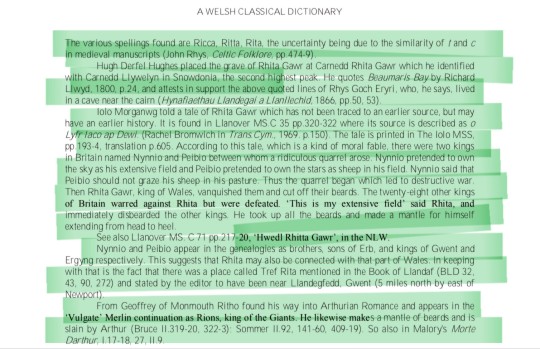
I distinctly remember him being one of my first brush-ins with Welsh Arthurian legends cuz I read about him on the back of a leaflet about Yr Wyddfa (Snowdon). If I recall, the detail that got me the most was the fact that Arthur supposedly defeated him by tricking him and pretending to eat a large amount of food but secretly depositing it into a sack and when Rhitta Gawr asked Arthur told him that he'd 'cut a hole in his stomach.' Rhitta, trusting this dude, who he LITERALLY WANTED TO FUCKIN KILL EARLIER, chopped a hole in his stomach and promptly died. 👌🏻👏🏻 Da iawn Rhitta. Now, also, I want to say that one of the various spellings of his name, 'Ricca' also pops up in 'Culhwch and Olwen' as Arthur's half-brother, the King of Cornwall. Idk if they are supposed to be the same person or not but, like, Arthur was a giant. It's possible.
Now, onto some little lads.




You'll notice that most of these lads were slain by Gwalchmai. I fear he was That Lad. For the Gawain Girlies, how does it feel to have Wales' best Giant fighter for your character?
(Also, NO LAUGHING AT PYSCOC. IT'S PRONOUNCED PEE-SCOC. Don't say, as my friend did, 'Castell Cock' when you mean Castell Coch. I will murder.)
Now, for the Cath Palug, tumblr with NOT let me add an image (boo!) So, I will write it up for you and then YAP.
'Palug (legendary)
Cath Palug is mentioned in a triad (YTP n. 26) where we are told that sow, Hen Wen (white head), while being followed by the magician Coll ap Collfrewy, brought forth a kitten at Maen Du in Llanfair in Arfon. Coll threw the kitten into the Menai (pls don't. The Swellies, man. THE SWELLIES.) and she was afterwards Cath Palug. Another version, (26 W) adds that the sons of Palug fostered it to their own harm. And that was Cath Palug and it was one of 'The Three Great Oppressions' nurtured therein.
The latter version treats Palug as a personal name but it's been also suggested that it could mean 'Scratching Cat.' (Very apt if u ask me.)
The only other mention of it is in 'Who is the Porter?' in the Black Book of Carmarthen:
'Cai the Fair went to Môn
To destroy hosts [or lions]
His shield was a fragment
Against Cath Palug
Nine score fierce [warriors]
Would fall as her food.'
The poem breaks off at this point but it's assumed Cai was the slayer.'
And then in Arthurian Legend: 'in the Vulgate either Arthur slayed the cat or was slayed by it. The Welsh version, which says Cai was the slayer, was also known to John Fordun who, in his Scotichromincon writes: 'But we have heard old hags tell some such fable - that it so happened that one of Arthur's soldiers - Kayus - had to fight an enormous tom-cat; which, seeing the soldier prepared to fight obstinately, climbed to the top of a great rock, and coming down, after having made its claws wondrous sharp for the fight, it gashed the rock with sundry clefts and winding paths beyond belief. Kayus, however, they say killed the cat.'
It's interesting that in the different versions of the triads the reason how Y Palug got her name is different. I'd argue that, perhaps, the Scratching Cat is the more likely reason for the name, as it has the common root 'pal' which might mean cut, lop, scratch claw, or dig pierce. It also shares the same root as palu (dig) and paladr (spear shaft.)
Also, the fragmentary poem says that Cai's shield is 'mynud' against the cat which can plausibly mean polished or mirrored. So he's a bit like Perseus against Medusa! Also, Cai as a giant is probably the perfect combative against a giant cat considering his powers. Like, I would NOT wish to fuck with Cai or Cath.
Anyways, that it for today! Hope u all enjoyed!! Also, I do absolutely think that Gwalchmai was justified in killing all those giants. He needed enrichment. The Giants probs pissed him or Gwenhwyfar off. I think she probably even helped him with some cuz I would.
Hwyl fawr!
(Also, if u have any suggestions as to what u wanna read about next lmk! Marriage laws will be up this Sunday!).
#arthuriana#welsh mythology#mabinogion#the mabinogion#welsh myth#y mabinogi#the mabinogi#arthurian legend#arthurian mythology#cath palug#idris gawr#cader idris#rhitta gawr#sir kay#sir gawain#gwalchmai#cai#Ysbaddaden Pencawr#culhwch ac olwen#culhwch and olwen#went real welsh in this one so apologies#arthurian literature#celtic giants#okay gonna stop typing as my handies hurt now#guinevere#i was gonna do llacheu also because his mum and dad are giants but i was tired#giants#arthurian#welsh folklore#king arthur
25 notes
·
View notes
Note
could you tell me about arthur's bastard (and legitimate) children?
(Word of Caution: For various reasons, including inaccessibility of source materials, I am not fully read up on all the details of the source materials involving the following characters. Nor am I aware of all known children of Arthur. Therefore, I should advice discretion)
First are the two major sons, both of whom changed legitimacies as the legend evolved:
Mordred - Originally a nephew by Arthur's full sister Anna/Morgause in Historia Regum Britanniae, Mordred is later converted into Arthur's bastard son, conceived incestuously, in Vulgate Cycle. The Welsh Dream of Rhonabwy suggests that Mordred was fostered by Arthur (a normal practice of both Romans and Celts)
Loholt/Ilinot - First appeared in Erec and Enide and apparently based on the Welsh character of Llacheu, Loholt was originally a Legitimate son of Arthur by Guinevere in Perlesvaus and the German Tradition. But Vulgate Cycle alters this so that Loholt is instead another bastard son by a certain Lisanor prior to Arthur's marriage to Guinevere.
Next are the ones with Unknown Mothers (and thus of ambiguous legitimacy and relationship to Guinevere):
Amr/Amhar - Son of Arthur mentioned in Historum Brittonum as being killed by Arthur himself. His grave is described as naturally changing size with every look, implying supernatural influence. He is also mentioned in the Welsh Geraint, as one of Arthur's Four Chamberlains
Gwydre - Son of Arthur mentioned only in Culhwch and Olwen. He is killed by Twrch Trwyth alongside two maternal uncles of Arthur.
Llacheu - The most celebrated of the Welsh sons of Arthur, with mentions in Pa Gur, The Welsh Triads and other Welsh Poetic Material. Is usually identified with Loholt, with the Welsh adaptation of Perlesvaus - Y Seint Grail - being the most notable in that regard.
Duran - Son of Arthur only found in a 15th Century Welsh Manuscript, where he is said to have perished during the Battle of Camlann
Archfedd - Daughter of Arthur, found in the Welsh genealogical work Bonedd Y Saint, where she is said to have married Llawfrodedd, one of Arthur's warriors, and bore two children, Efadier and Gwrial
Apollonius, Iron and Hilde - Two sons and a daughter found in the 13th Century Icelandic Thidrekssaga.
Aristes - Son of Arthur mentioned in the Old Norse Mottuls saga
Legitimate Children of Arthur (Although not necessarily Guinevere's children)
Samson the Fair and Grega - Son and Daughter of Arthur by his wife, Queen Silvia. Both found in the Norse Samson saga fraga
Adeluf III, Morgan the Black and Patrick the Red - Three sons of Arthur, from Eldest to Youngest, from Rauf de Boun's 14th century chronicle, Petit Brut. Presumbly, sons of Queen Guinevere, but Rauf de Boun fails to mention the name of Arthur's wife. However, Adeluf III is made heir and assumes the Throne of England whilst Patrick and Morgan are given sizable inheritances in the form of Scotland and Wales. (Note: Wikipedia claims they're Arthur's sons by a fairy queen, but the cited source does not say so. Link to source HERE)
Seleucia - Daughter of Arthur by his first wife, Liscanor (Lisanor), in Jorge Ferreira de Vasconcelos' 16th century Portugese novel Memorial das Proezas da Segunda Tavola Redonda. (*This technically makes her the full sister of Lisanor!Loholt) She married Arthur's successor, Sagramor Constantino (a combination of Sir Sagramore and Constantine, son of Cador) and may have even bore a daughter, Princess Licorida
Huncamunca - Daughter of Arthur and his wife, Queen Dollalolla, from Henry Fielding's 1730 Tom Thumb play
Melora - Daughter of Arthur and Guinevere from the Irish romance Eachtra Mhelóra agus Orlando. One of the more well-known daughters of Arthur and one of the very few warrior women in Arthuriana.
Merevie/Smerbe/Smerviemore - Son of Arthur by his second marriage to a french princess, Elizabeth. Figures primarily in the genealogical legends of Scottish Clan Campbell, who claim descent from Arthur through Smervie.
Rowland, Ellen and Two unnamed older brothers - Certain versions of the Ballad of Childe Rowland and Burd Ellen portray them as the sons and daughter of Arthur and Guinevere, apparently due to the mention of Merlin.
Tryphine's son and daughter - A certain mystery play collected by François-Marie Luzel in 1863 merges Saint Tryphine from the Conomor legend with aspects of Queen Guinevere, with the primary antagonist being the lady's brother Kervoura. The two children are unnamed, but the son goes by an alias, "the Malouin"
Iduna - Daughter of Arthur and Guinevere from Edgar (1839), by Adolph Schutt
Blandine - Daughter of Arthur and Guinevere from Les Chevaliers de la Table Ronde (1937), by Jean Cocteau
Bastard Children of Arthur:
Kyduan/Cydfan - Son of Arthur by Eleich ferch Iaen. Mentioned in Culhwch and Olwen and Bonedd yr Arwyr
Arthur le Petit - Son of Arthur from Post-Vulgate, born of Arthur's deliberate rape of a daughter of Sir Tanas. Arthur le Petit serves as a "good" counterpart to Sir Mordred. He loyally serves his father incognito for many years and despises Lancelot's faction for causing the destruction of Logres. He is slain by Sir Bleoberis.
Tom a Lincoln - Eponymous hero of the 16th century romance Tom a Lincoln, by Richard Johnson. Son of Arthur by Angelica, a daughter of the Mayor of London. Fathers two additional characters, the Black Knight and the Faerie Knight.
Gyneth - Daughter of Arthur by a half-genie named Guendolen. From Walter Scott's The Bridal of Triermain (1813). A huntress whose Marriage competition results in the death of many knights including Vanoc, who is implied to be Merlin's son. As a result, Merlin puts her into an enchanted sleep for many centuries until her true love awakens her with a kiss.
And finally, those with a tenuous link to Arthuriana:
Nathalia - a supposed daughter of Arthur who accompanied St. Ursula according to De Sancta Ursula: De undecim milibus Virginum martirum (1183), by Herman Joseph
Baeddo - Wife of the Visigothic Spanish king Reccared. Claimed to be a daughter of Arthur by Compendio Historial, by Esteban de Garibay y Zamalloa
Tortolina - a daughter of Arthur according to Pantochronachanon (1652), by Thomas Urquhart
*(Additional Source link about the Daughters of King Arthur: HERE)
#asks#arthuriana#the children of king arthur#sir mordred#sir loholt#amhar#amr#gwydre#llacheu#duran#melora#archfedd#gyneth#huncamunca#arthur le petit#welsh mythology#arthurian mythology#arthurian literature#modern arthuriana#arthurian legend#arthurian retelling#hilde#apollonius#childe rowland and burd ellen#tom a lincoln#bridal of triermain#perlesvaus#culhwch and olwen#bonedd y saint#Smerviemore
46 notes
·
View notes
Text
Arthur after insulting and losing kay in Culhwch and Olwen and now being hunted down by a giant city leveling pig:




Arthur what’s wrong with you

oh no
#arthuriana#art#arthur#king arthur#culhwch and olwen#the pig that destroys the castle#twrch#knights am I right
23 notes
·
View notes